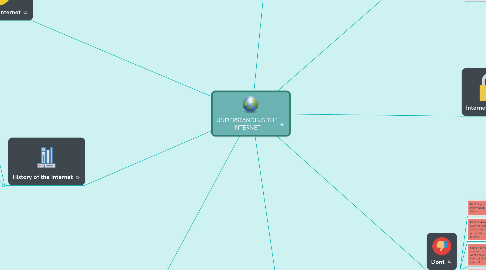UNDERSTANDING THE INTERNET
by Rebecca Kelson

1. What is the Internet
1.1. The internet is the biggest computer network in the world. It connects millions of computers world wide in order for people to connect, share a and create information.
1.2. The internet has a wide range of uses and applications that we readily use in our everyday lives
1.3. The world wide web is one aspect of the internet. It allows internet users to freely access and travel from one site to another
1.4. WAYS WE USE THE INTERNET : Finding and sharing information, keeping up with current world events and news , connecting with others via email or instant messaging, social networking sites, playing games, listening to music , online shopping and many many more
2. Search Engines
2.1. Search engines are programs available via the internet with a huge database of information. Internet users can use search engines to search for content or information.
2.2. SAFE SEARCH ENGINES FOR KIDS : KidsClick, Kid's Search, Kiddle, KidRex
2.3. POPULAR SEARCH ENGINES: Google ,Yahoo!, bing, Ask.com
3. History of the Internet
3.1. The internet was first invented in the 1960's. Since then it has changed a lot, it was not always the same as the internet we know and use today. Watch the video below for more information on the history and advances of the internet.
3.2. HISTORY OF THE INTERNET
4. Social Networks
4.1. Social networking sites (social media) are internet sites or programs made with the intent of connecting friends, families and associates. These sites give users the ability to share thoughts, pictures and life updates with their friends or 'followers'.
4.2. POPULAR SOCIAL NETWORKING SITES : Facebook, Instagram, Twitter, Youtube, Pintrest, Snapchat
4.3. Businesses also use social media to advertise and expand their business to a wider audience.
4.4. Celebrities often use social media sites to connect with and update their fan bases.
5. How to search
5.1. REFINE - Find out what you are looking for and use keywords and synonyms
5.2. BE SPECIFIC - simplify and make sure your key words clearly relate to your topic
5.3. SEARCH - read beyond the first few search results
5.4. ASSES - make sure the information is reliable and relevant to your topic
5.5. REWRITE - write the information in your words and give credit to the original writer / webpage
6. Internet Safety
6.1. Protect your devise by purchasing and installing antivirus, anti-spyware and anti-malware programs
6.2. Never give out personal information such as your home address over the internet
6.3. Keep credit card information private
6.4. PASSWORDS : Make passwords strong by including upper case, lower case, symbols and numbers. Don't use the same password for everything. Always log out.
6.5. Find more advise on internet safety here: https://bit.ly/2Jdl0jb
7. Do
7.1. ALWAYS be critical when opening emails . Check with a parent or teacher before opening an email you do not recognise. Untrustworthy emails can make your computer susceptible to spam and viruses
7.2. ALWAYS tell a parent or teacher if someone you do not know tries to connect with you over the internet
7.3. ALWAYS keep social media profiles private and all personal information secure
7.4. ALWAYS be sure to use reliable and relavant information
7.5. ALWAYS follow the rules your parents and teachers have given you in regard to the internet. They are there for your safety
7.6. ALWAYS tell you parents or teacher about anything you encounter over the internet that makes you feel uncomfortable, unsafe or that you are unsure about
8. Dont
8.1. NEVER give any of your personal information away to unsafe or untrustworthy sites
8.2. NEVER share any photographs or opinions over the internet you may later regret or want to remove. Once something has been put on the internet it is almost impossible to remove
8.3. NEVER send or post hurtful or mean content over the internet to anyone. Our words have meaning even over the internet. Bullying is wrong even over the internet
8.4. NEVER talk to or connect with someone you do not know over the internet. Not everyone on the internet is who they say they are / pretend to be.
8.5. NEVER hide anything you encounter or engage in over the internet from your parents or teachers


